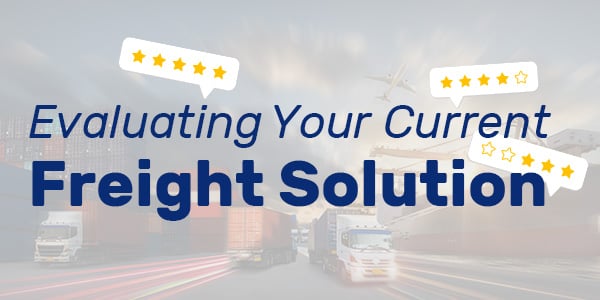
A freight forwarder is worth considering when shipping globally on a large scale. They help transport goods where they need to go, on time and within budget. If you already understand how critical a freight forwarder is for your business, it’s important to take stock of whether or not your current partner is getting the job done right.
If you’re reading this blog, you probably have a current freight forwarder and may be wondering if you’re getting the best solution possible for the transportation and importation of your goods.
Switching freight forwarders can seem daunting. Companies in a difficult freight partnership may stick with the forwarder they know out of fear that the forwarder they don’t know may make things more complex and confusing. Your concerns about switching freight forwarders are valid. Ideally, your current freight forwarder understands your company’s shipping processes, procedures, regulations, routes, and other considerations specific to your business.
Whether it’s time to switch freight forwarders or grasp how the current freight solution works, it’s critical to know how to evaluate a freight forwarder to ensure all needs are met.
There are six main considerations to keep in mind when evaluating a freight forwarder. Reviewing these considerations will help determine whether a company has the best freight forwarder relationship for its needs or if there are things it can change to improve its freight forwarding solution.
6 Ways to Evaluate Your Current Freight Forwarding Solution
- Relationship. Is the current relationship working? Companies need to think about the relationship they want. A company may want a live voice on the other end of the line ready to walk them through their freight forwarding concerns. A larger company may want to turn everything over to its freight partner and take a more hands-off approach. A freight forwarder with a personality that meshes with a company's needs and goals is always the best choice for a successful long-term partnership.
- Core Values. A company’s culture matters. A freight forwarder’s core values aligning with your own can strengthen a company’s brand, increase efficiencies, and drive up customer loyalty. Why? Because a freight forwarder that aligns with an importer's values will treat that importer’s cargo like their own.
- Capabilities. Consider a freight forwarder with experience in the commodity and the country of origin the importer is working with. When transporting goods from Asia, for example, a freight forwarder with connections and experience in Asia makes more sense than one without. A trade partner with experience in the destination country will be much more effective and efficient at understanding that country’s specific rules and regulations.
- Cyber Security. Ask how the freight forwarder handles cyber security concerns. This is not the time to be lulled into a false sense of security. A cyberattack can shut down global operations for weeks and send customers scrambling for alternative transport solutions. A reliable freight forwarder has a plan for dealing with cyberattacks. They can keep goods moving when there are disruptions. Their vast carrier relationships help them secure cargo space on alternative routes in a pinch.
- Pricing. Some freight forwarders may lure companies with attractive, low-ball prices. But lower prices may not correlate to better service. Double-check that a freight forwarder’s rates include cyber security, excellent communication, and any other non-negotiable service your company needs. Using a low-priced forwarder without these benefits could lead to dire consequences down the road.
- Consider Two Freight Forwarders. Honesty and integrity should come with the job. But adding a second freight forwarder may be necessary. In today’s day and age of cyber threats, some companies realize the benefits of having two freight forwarders to hedge their bets in the case of a cyberattack.
3 Signs it’s Time to Consider a New Freight Solution
If you’re unsure as to whether it might be time to look into switching freight forwarders, there are several important factors to take into account.
- Customer Service Experience. Your forwarder should provide personalized, professional, and fast customer service. If this is continuously lacking, this is a sign that your current solution might not be the partner you need for long-term success.
- Your Business and Needs Have Changed. While it may be no fault of your current freight solution, a changing business sometimes naturally requires a freight forwarder with different capabilities and areas of expertise. For example, your business used to work domestically and has expanded internationally, is transitioning or expanding from air to rail freight, or any other shift that throws you out of alignment with your current freight solution.
- High Employee Turnover. Since your freight forwarding solution depends on the relationship between both parties, an ever-changing account manager can make things challenging. Regardless of the reasons behind a high staff turnover, you need a forwarder that promises stability and team members with knowledge and experience.
Takeaway
There are many factors to consider when making a change or evaluating an existing partnership. Knowing these considerations and examining a freight forwarder’s efforts against them ensures a company’s logistics needs are met.
Consider relationships, culture, capabilities, and pricing, but don’t stop there. Ask around and gather references. Hiring a freight forwarder is a big decision. Companies need to do their due diligence before they get locked into a freight management solution that damages their reputation or destroys their bottom line.



